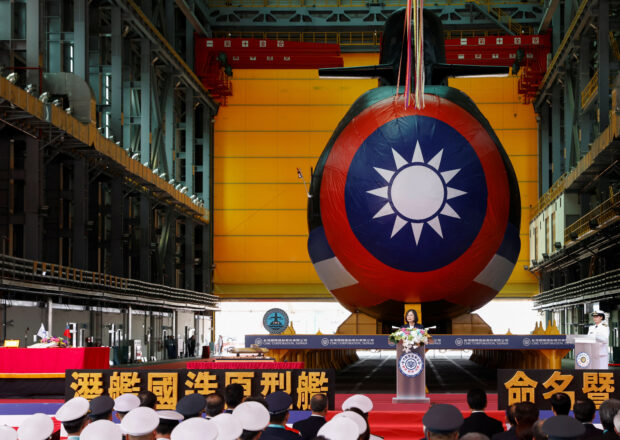
Taiwan’s President Tsai Ing-wen attends the launching ceremony of Haikun, its first domestically built submarine, in Kaohsiung, Taiwan September 28, 2023. REUTERS/Carlos Garcia Rawlins
KAOHSIUNG, Taiwan — Taiwan unveiled its first domestically developed submarine on Thursday, a major step in a project aimed at strengthening the island’s defense and deterrence against the Chinese navy, though it won’t enter service for another two years.
Taiwan, which China claims as its own territory, has made the indigenous submarine program a key part of an ambitious project to modernize its armed forces as Beijing stages almost daily military exercises to assert its sovereignty.
President Tsai Ing-wen, who initiated the plan when she took office in 2016, showed off the first of eight new submarines on Thursday in the southern city of Kaohsiung.
“In the past, a domestically developed submarine was considered an impossible task. But, today, a submarine designed and manufactured by our country’s people sits before our eyes,” Tsai said, adding that it would play an important role in strengthening the navy’s “asymmetric warfare” capabilities.
“Even if there are risks, and no matter how many challenges there are, Taiwan must take this step and allow the self-reliant national defense policy to grow and flourish on our land,” Tsai said, standing in front of the ship, named the Narwhal. Taiwan‘s red flag, featuring a white sun against a blue sky, was wrapped around the submarine‘s bow.
Tsai said the Narwhal will enter service in 2025, joining two existing submarines purchased from the Netherlands in the 1980s.
China’s defense ministry, responding to a question at a regular monthly press briefing about the submarine and how it could prevent China from surrounding the island, said Taiwan was “over-rating itself and attempting something impossible”.
“As for talk about preventing the People’s Liberation Army from entering the Pacific Ocean, this is idiotic nonsense,” spokesman Wu Qian told reporters in Beijing.
READ: Taiwan to unveil first domestically built submarine
READ: Taiwan urges China to stop ‘destructive’ military activities
Diplomatic breakthrough
The indigenous submarine program has drawn on expertise and technology from several countries – a breakthrough for diplomatically isolated Taiwan.
Cheng Wen-lon, head of Taiwan‘s CSBC Corp, which led the construction of the submarine, said the domestic content of the boat was about 40%. He made no explicit mention of foreign participation in his speech in Kaohsiung.
Underscoring the importance of the United States’ security relationship with the island despite a lack of official ties, the de facto U.S. ambassador to Taiwan, Sandra Oudkirk, attended the ceremony. The United States is Taiwan‘s largest arms supplier.
Speaking to reporters in Taipei, Taiwan Foreign Minister Joseph Wu said that faced with an increased threat from China’s military “grey zone” pressure tactics close to the island with air and naval activities, Taiwan had to strengthen its defenses.
“Having a new submarine is one of those strategies. For anyone who questions Taiwan‘s submarine strategy, I would be a most forceful advocate for Taiwan to acquire submarines because that’s needed to deter war from taking place,” Wu said.
Taiwan hopes to deploy at least two domestically developed submarines by 2027 and possibly equip later models with missiles, the head of the program said this month.
The first submarine, with a price tag of T$49.36 billion ($1.53 billion), will use a combat system by Lockheed Martin Corp and carry U.S.-made Mark 48 heavyweight torpedoes. It will enter sea trials next month before delivery to the navy by the end of 2024.
Admiral Huang Shu-kuang, Tsai’s security adviser leading the program, has described the submarines as a “strategic deterrent” that can also help maintain the island’s “lifeline” to the Pacific by keeping ports along Taiwan‘s eastern coast open.